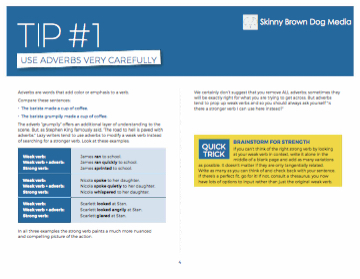TP#l USE ADVERBS VERY CAREFULLY Adverbs are words that add color or emphasis to a verb. Compare these sentences: · The barista made a cup of co ee. · The barista grumpily made a cup of co ee. The adverb ·grumpily" o ers an additional layer of understanding to the scene. But. as Stephen King famously said. 'The road to hell is paved with adverbs." Lazy writers tend to use adverbs to modi a weak verb instead of searching r a stronger verb. Look at these examples: Weak verb: Weak verb + Strong verb: Weak verb: Weak verb + Strong verb: Weak verb: Weak verb + Strong verb: Skinny Brown Dog Media adverb: adverb: adverb: as possible. It doesn't matter if they are only tangentially related. Write as many as you can think of and check back with your sentence. If there's a perfect fit. go r it! If not. consult a thesaurus: you now have lots of options to input rather than just the original weak verb. James ran to school. James ran quickly to school. James sprinted to school. Nicola spoke to her daughter. Nicola spoke quietly to her daughter. Nicola whispered to her daughter. Scarlett looked at Stan. Scarlett looked angrily at Stan. Scarlett glared at Stan. QUICK TRICK BRAINSTORM FOR STRENGTH If you can't think of the right strong verb by looking at your weak verb in context. write it alone in the middle of a blank page and add as many variations In all three examples the strong verb paints a much more nuanced and compelling picture of the action. 4 We certainly don't suggest that you remove ALL adverbs: sometimes they will be exactly right r what you are t ing to get across. But adverbs tend to prop up weak verbs and so you should always ask yourself "Is there a stronger verb I can use here instead?"
